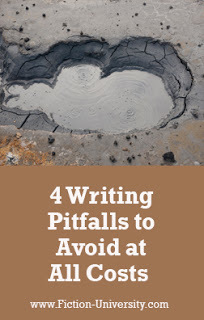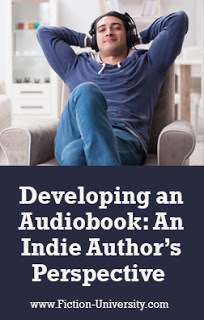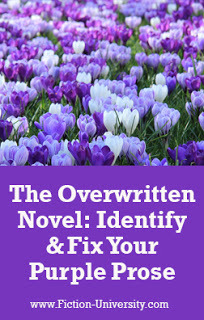Janice Hardy's Blog, page 70
July 18, 2019
8 Things Every Writer Needs to Remember
 By Sherry Howard, @SherLHoward
By Sherry Howard, @SherLHoward
Part of The Writer's Life Series
JH: They say hindsight is 20/20, but with today's resources, we can all benefit from what others have learned. Sherry Howard returns to the lecture hall this month to talk about motifs and how they strengthen our writing.
Sherry Howard lives in Middletown, Kentucky, in a household busy with kids and pets. She worked as an educator, and now has the luxury of writing full time. Her debut picture book, Rock and Roll Woods , released in October, 2018. And her middle grade NF, Deep Sea Divers , just released. She has more books in the pipeline for publication soon.
Sherry loves to meet other readers and writers, so be in touch on social media here:
Website | Facebook | Twitter | Instagram | Goodreads
Take it away Sherry…Continue ReadingWritten by Janice Hardy. Fiction-University.com
Published on July 18, 2019 04:37
July 17, 2019
The Perils of Not Knowing What Happens Next in Your Story
 By Janice Hardy, @Janice_Hardy
By Janice Hardy, @Janice_Hardy Getting stuck in your writing doesn't mean you've got writer's block.
At some point, we all hit a wall in our writing. We get stuck, we don't know what happens next, maybe we know where we need to go, but not sure how to get there.
Hitting a wall can freak us out and make us panic, because it feels a lot like writer's block. We get stuck and fear the words won't come anymore, and struggle to get anything down, and nothing works. But most of the time, we're not blocked at all--it's just our subconscious telling us we're missing something we need to move forward.
Next time you hit a writing wall, take a deep breath, step back, and diagnose what the problem might be:
Continue ReadingWritten by Janice Hardy. Fiction-University.com
Published on July 17, 2019 03:00
July 16, 2019
4 Writing Pitfalls to Avoid at All Costs
 By Laurence MacNaughton, @LMacNaughton
By Laurence MacNaughton, @LMacNaughtonPart of the How They Do It Series
JH: Even though every writer has their own process, we still all face the same problems from time to time. Laurence MacNaughton is back this month with tips on avoiding the pitfalls no writer wants to stumble into.
Has your writing fallen into a black hole? Has your pacing dropped to a crawl, or your suspense become a snore? Do you just feel stuck? You might be sabotaging your own writing without even knowing it. But don't panic. Here's how to avoid the four most perilous pitfalls of writing.
Pitfall #1: Your plot is going nowhere.
If your story is bogging down, it's probably because you (the author) need to spend more time visualizing the specific outcome your main character wants.
Think about your main character for a minute. This person should desperately want to either: A) achieve something positive; or B) avoid something negative. Maybe both.
What does your main character want, exactly?
Continue ReadingWritten by Janice Hardy. Fiction-University.com
Published on July 16, 2019 05:05
July 15, 2019
What Matters More? Story Execution or the Idea?
 By Janice Hardy, @Janice_Hardy
By Janice Hardy, @Janice_HardyThe age-old quandary--is a well-written novel novel better than a great idea?
Idea or execution. Two directions many writers struggle with. Should they write the technically perfect book and not worry about the idea, or find the perfect story and not worry about the writing?
The realty is that each takes precedence at different points of a writer's career. Sometimes you'll want to worry about the technical aspects of writing, and later, the storytelling is what matters more. By the end of your path, both become vital for success.
But you don't have to hit that end goal first, and focusing on the wrong aspect at the wrong time can even hurt you. I've seen plenty of first-time writers worry so much over finding the perfect idea that it keeps them from writing at all. I've also seen many long-term writers who were so sure of their ideas that they didn't bother to edit after a first draft.
Both types of writers struggled much more than than needed to.
For those of you heading down the writing path and wondering which matters more--idea or execution--consider where you are on your journey before you decide where to put your creative energy.
Continue ReadingWritten by Janice Hardy. Fiction-University.com
Published on July 15, 2019 03:00
July 13, 2019
Real Life Diagnostics: Is There Enough Tension and Interest to Keep You Reading?
 Critique By Janice Hardy, @Janice_Hardy
Critique By Janice Hardy, @Janice_HardyReal Life Diagnostics is a weekly column that studies a snippet of a work in progress for specific issues. Readers are encouraged to send in work with questions, and we diagnose it on the site. It’s part critique, part example, and designed to help the submitter as well as anyone else having a similar problem.
If you're interested in submitting to Real Life Diagnostics, please check out these guidelines.
Submissions currently in the queue: Two
Please Note: As of today, RLD slots are booked through July 27.
This week’s questions:
1. What are your expectations from these opening lines?
2. In your view, what promise is made to the reader?
3. Is there enough tension to keep you reading?
4. What is your overall impression?
Market/Genre: General Fiction
Note: This is a revised snippet: Here’s the original if you’d like to see what the author did.
On to the diagnosis…
Continue ReadingWritten by Janice Hardy. Fiction-University.com
Published on July 13, 2019 03:00
July 12, 2019
Whose Head is it Anyway? Understanding Omniscient Point of View
 By Janice Hardy, @Janice_Hardy
By Janice Hardy, @Janice_Hardy This week's Refresher Friday takes an updated look at writing the omniscient point of view.
One of the more challenging point of views to write is the omniscient point of view. You'd think it would be easiest, since it's "someone outside the story telling the story," and the author fits that description, but an omniscient narrator makes it easier to fall into a common writing issues, such as infodumping and telling.
For those unfamiliar with the term, third person omniscient point of view is when somewhere other than a character in the book is telling the story. This outside narrator knows things the characters don't, can make comments about what's happening (or about to happen) or see inside the heads of other characters.
That's the key to omniscient point of view: it conveys things the characters don't or can't know.
Seems easy enough, right?
The trouble is, a detached third person limited can sound a lot like third person omniscient, especially if it's not changing characters. So much so, that sometimes it's hard to know the difference.
Continue ReadingWritten by Janice Hardy. Fiction-University.com
Published on July 12, 2019 03:30
July 11, 2019
Developing an Audiobook: An Indie Author’s Perspective
 By Ray Flynt
By Ray FlyntPart of The Indie Author Series
JH: Audiobooks are hugely popular, but not every author knows how to create one for their novels. Ray Flynt is back in the lecture hall today to walk us through the process of creating an audiobook.
In its purest form, writing a novel is storytelling. The world’s first books undoubtedly had their genesis in timeless stories once told around campfires. We also know that children learn to read and develop their own love of books by being read to, whether from those first Golden Books or hearing about the adventures of Harry Potter.
Thanks to ACX.com (an Amazon company) Indie Authors can see their stories come to life as an audiobook. It makes sense to have your books available in as many formats as possible to appeal to a broad audience. I’m always puzzled when I see Indie Authors say, “I only have my novel available as an eBook, since a print version would be too expensive.” It’s my contention that if you’re willing to spend time and a modest amount of money, you can easily develop a trade paperback. In this article, I’ll provide my perspective on adding an audiobook format to your available mix.
Continue ReadingWritten by Janice Hardy. Fiction-University.com
Published on July 11, 2019 04:32
July 10, 2019
The Overwritten Novel: Identify & Fix Purple Prose in Your Novel
 By Janice Hardy, @Janice_Hardy
By Janice Hardy, @Janice_Hardy Going too far in our writing happens, and a good sentence or even scene can turn into an overwritten mess.
The term purple prose has been around as long as I've been writing, and chances are you've heard it to. You'll also hear folks say "the prose is too flowery" or it feels "overwritten." People know it when they see it, but how do you spot it in your own work? And more importantly--how do you fix it?
If you're unfamiliar with the term, purple or flowery prose is so filled with adjectives and adverbs, similes and metaphors, that it screams "hey look! I'm fancy writing" and distracts you from the actual story. You often need a thesaurus just to read it.
Overwritten text is trying too hard, either trying hard to sound "written" or trying to explain too much. For example, one sentence that uses fifteen words when three is enough. Or explaining every single step in a task that doesn't need it. If you ever thought to yourself, "Yeah, I get it, he was angry, move on" then you probably read an overwritten passage.
(Here's more on Avoid Overwriting – Subtle is More Sophisticated)
Written by Janice Hardy. Fiction-University.com
Published on July 10, 2019 03:30
July 9, 2019
Plotting Made Easy: Do You Need the Three-Act Structure?
 By Alex Limberg, @RidethePen
By Alex Limberg, @RidethePenPart of the How They Do It Series
JH: Not every writer writes the same way, and not every story follows the same path. Please help me welcome Alex Limberg to the lecture hall today to share some thoughts on why and when you might want to ignore the three act structure.
Alex is blogging on ‘Ride the Pen’ to help you boost your fiction writing. His blog dissects famous authors (works, not bodies). Create intriguing descriptions of body language or any other story part with his free ebook “44 Key Questions” to test your story (download here)or check out his creative writing exercises. Shakespeare is jealous. Alex has worked as a copywriter and lived in Vienna, Los Angeles, Madrid and Hamburg.
Website | Facebook | Twitter
Take it away Alex...
Continue ReadingWritten by Janice Hardy. Fiction-University.com
Published on July 09, 2019 03:57
July 8, 2019
Plotting for the Thrill: Making the Most of the Worst That Can Happen
 By Janice Hardy, @Janice_Hardy
By Janice Hardy, @Janice_HardySometimes the worst thing that can happen to your protagonist is the worst thing for the story, too.
"What's the worst thing that can happen? Do it," is good advice when plotting a novel. It adds conflict, escalates the stakes, and raises the tension.
The downside, though, is that sometimes letting our readers know what "the worst thing" is, is actually bad for the story.
I ran into this problem when I was drafting my fourth novel. The "worst thing" was something pretty darn terrible, so when my protagonist found out about it, she naturally tried to stop it (as protagonists are wont to do).
Unfortunately, this happened well before the third act and climax of the novel, so "the worst thing" was out there in the story and readers would know what it was. Knowing it would spoil a lot of the tension because the stakes could no longer escalate.
I had a choice to make--tell the reader and risk killing my tension or keep it a secret and risk not raising the stakes enough.
If you're facing this dilemma n your current project, here are some things to consider:
Continue ReadingWritten by Janice Hardy. Fiction-University.com
Published on July 08, 2019 04:01



